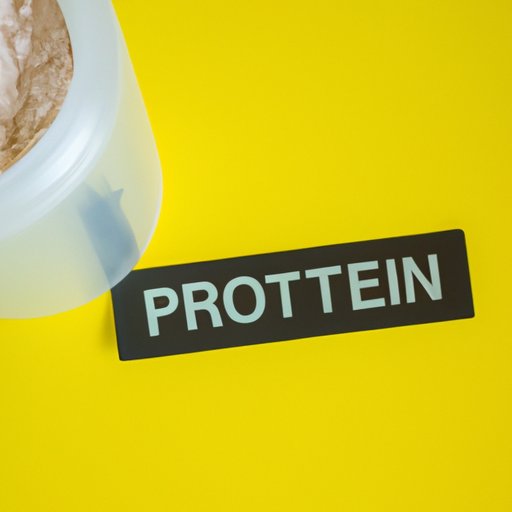
Does Protein Powder Help You Lose Weight?
Struggling with weight loss is an incredibly common experience, but finding a solution can feel impossible. One potential solution that has gained popularity in recent years is protein powder. With promises of weight loss and improved muscle tone, it’s easy to see why protein powder has caught the eye of many looking for a solution. But does it really work? This article will explore the truth behind protein powders for weight loss, ways to maximize success with protein powder, the science behind how it works, personal success stories, and the pros and cons to determine if protein powder is right for you.
The Truth about Protein Powders for Weight Loss: Separating Fact from Fiction
First, it’s important to address some common myths about protein powders for weight loss. The biggest myth is that protein powders alone can help you lose weight. While protein is an important part of a weight loss diet, it’s not a miracle solution. It’s also important to note that not all protein powders are created equal. Some are high in sugar and calories, which may hinder weight loss efforts.
However, there is scientific evidence to suggest that incorporating protein powder into a weight loss diet can be beneficial. Protein is more satiating than carbohydrates and fat, meaning it keeps you feeling full for longer. This can help reduce overall calorie intake and lead to weight loss. Additionally, protein can help preserve muscle mass while losing weight, which can improve overall body composition.
It’s important to remember that protein powder is a supplement, not a magic solution. It should be used in conjunction with a healthy diet and regular exercise for best results.
Maximizing Weight Loss with Protein Powder: Tips and Tricks
When it comes to incorporating protein powder into a weight loss diet, there are a few things to keep in mind. First, it’s important to choose a high-quality protein powder that is low in sugar and calories. Whey protein isolate and plant-based proteins like pea and soy are good options to consider.
Recommended serving sizes and timing can vary based on personal needs and goals, but a general guideline is to aim for 20-30 grams of protein per serving and to consume protein powder within 30 minutes of physical activity. This can help promote muscle recovery and growth.
There are also plenty of ways to get creative with protein powder. Recipes like protein smoothies, protein pancakes, and protein balls are all delicious ways to incorporate protein powder into your diet.
The Science behind Protein Powder and Weight Loss: How It Works
Protein plays an important role in weight loss for a few reasons. First, protein is more satiating than other macronutrients, meaning it keeps you feeling full for longer. This can help reduce overall calorie intake and promote weight loss. Additionally, protein is important for preserving lean muscle mass. When losing weight, it’s common to lose both fat and muscle. Consuming adequate protein can help preserve muscle mass and improve overall body composition.
There are several types of protein powders available, each with their own unique benefits. Whey protein, for example, is a fast-digesting protein that is great for post-workout recovery. Casein protein, on the other hand, is a slow-digesting protein that is ideal for bedtime snacks. Plant-based protein powders like pea and soy are good options for those with dietary restrictions.
The mechanisms by which protein powder promotes weight loss are multifaceted. In addition to promoting satiety and preserving muscle mass, consuming protein can also increase energy expenditure and improve metabolism.
Personal Success Stories: How Protein Powder Helped These Individuals Lose Weight
While the science behind protein powder and weight loss is promising, it’s helpful to hear real-life success stories. Here are a few individuals who have successfully used protein powder for weight loss.
“I’ve been using protein powder for several years now and it’s made a huge difference in my weight loss journey. It helps me stay full and satisfied between meals, which makes it easier to stick to my diet. Plus, it makes post-workout recovery a breeze.” – Sarah
“I used to struggle with binge eating, but since adding protein powder to my diet, I’ve been able to keep my cravings under control. It helps keep me feeling full throughout the day, which has been a game-changer for my weight loss journey.” – Alex
“I’ve always struggled with maintaining muscle mass while losing weight. Adding protein powder to my diet has helped me preserve my muscle mass and improve my body composition.” – Jake
Exploring the Pros and Cons of Protein Powder for Weight Loss: Is It Right for You?
While protein powder can be a helpful tool for weight loss, it’s important to consider the potential drawbacks. For some individuals, protein powder may be too high in calories or may not fit into their diet or lifestyle. It’s also important to choose a high-quality protein powder that is free of harmful additives.
Overall, protein powder can be a great option for those looking to lose weight and improve their overall body composition. It’s important to use it as a supplement, not as a magic solution, and to pair it with a healthy diet and regular exercise.
Conclusion
Protein powder can be a helpful tool for weight loss, but it’s not a miracle solution. When paired with a healthy diet and regular exercise, it can promote weight loss, preserve muscle mass, and improve overall body composition. It’s important to choose a high-quality protein powder that fits into your individual needs and goals to maximize success. So whether you’re looking to lose a few pounds or maintain a healthy weight, consider incorporating protein powder into your weight loss journey.




